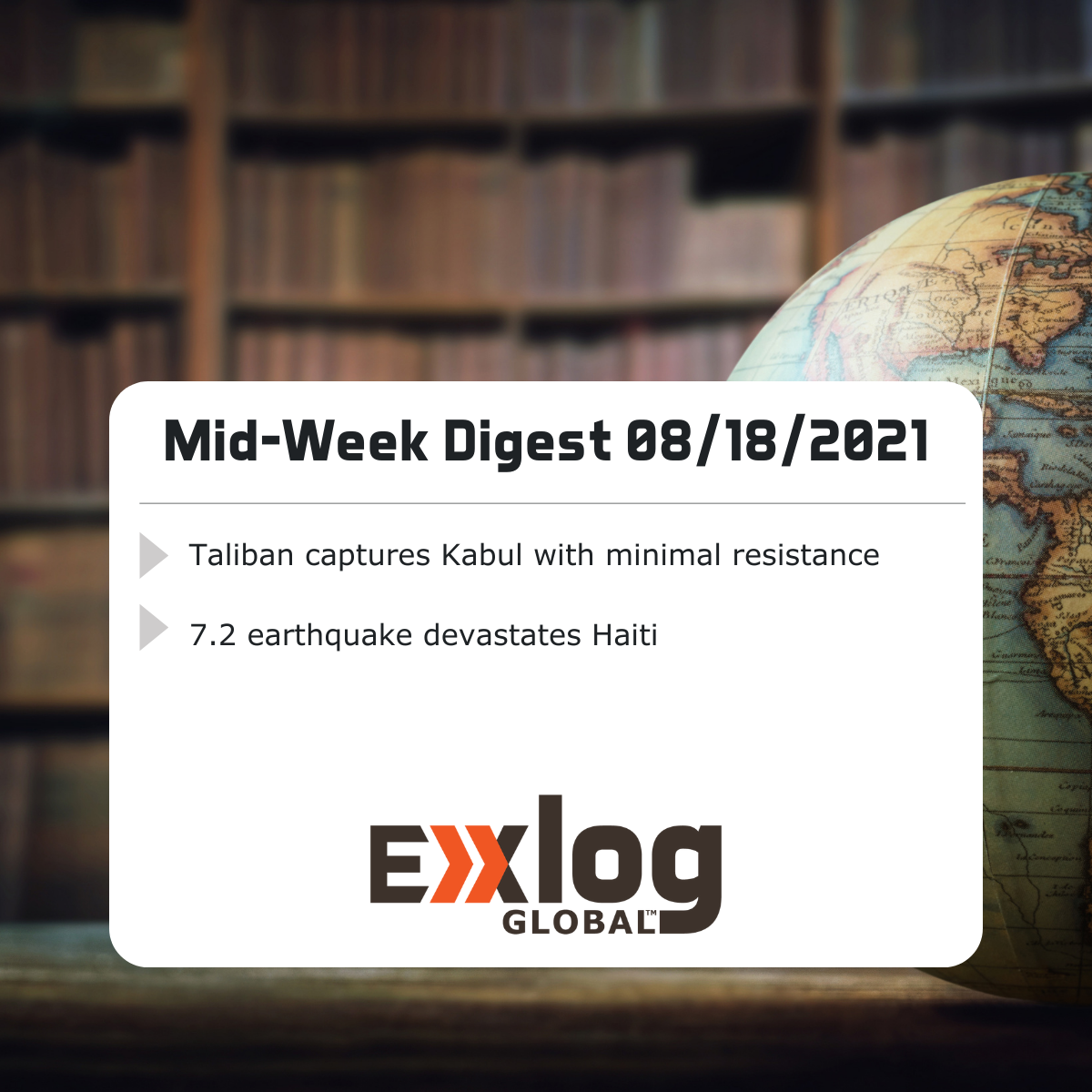Taliban captures Kabul with minimal resistance and 7.2 earthquake devastates Haiti
Afghanistan: Taliban takes control of Kabul, triggering mass evacuations of local and foreign nationals
Political control of Afghanistan has decisively shifted from the internationally-recognized government to Taliban leadership following a 10-day nationwide offensive that culminated with fighters seizing Kabul on August 15. Taliban members freed thousands of inmates from the Pul-e-Charkhi prison, and took control of all Afghan National Defense Security Forces (ANDSF) positions as well as the Presidential Palace after President Ashraf Ghani fled the country. While there were no reports of widespread urban fighting between the Taliban and the ANDSF, operational disruptions have been severe since the capital fell. Significant power outages and communications disruptions were recorded throughout the city, and banks reported currency shortages as Afghans tried to withdraw personal funds en masse. The Taliban has installed checkpoints and is actively patrolling the streets of Kabul, including the former Green Zone. Foreign governments began evacuating all personnel from their embassies on August 15, and other international entities and NGOs have followed suit; evacuations are expected to continue over the next several days. Hamid Karzai International Airport has been overwhelmed with thousands of Afghans attempting to flee the country; commercial flights out of Kabul were canceled on the morning of August 16, and civilian flights en-route to Kabul were diverted. As of August 18, 4,000 US troops, assisted by 500-600 Afghan security forces, have been managing evacuations at the airport; at least 3,200 people, including 1,200 American citizens and permanent residents, third-country nationals, and nearly 2,000 Special Immigrant Visa applicants, have been evacuated. The US still controls the military side of the airport, while the Taliban controls access roads to the civilian section, meaning anyone attempting to enter the airport’s main gates must pass through their checkpoints.
The operational and security environment both in the Afghan capital and across the country is almost certain to evolve rapidly under Taliban authority – with the country likely becoming even more inhospitable to a majority of foreign organizations. After facing negligible ANDSF resistance during its blitz across the country, the Taliban reportedly controlled more than three-quarters of all Afghan provincial capitals as of August 15. As meetings between Taliban negotiators, the Afghan delegation, and Doha’s leaders over a comprehensive political settlement continue in Qatar, the Taliban’s military successes are likely to secure them near-total control of the levers of power in Afghanistan. The Taliban has declared an “amnesty” for all Afghans who worked with foreign actors and urged women to join their government. However, such statements are likely part of the group’s tactic to paint themselves as moderate and legitimate to an international audience; the Taliban has a poor historical track record in portraying itself honestly, as evidenced in the Doha peace talks and their actions within the country over previous decades. Media sources reported that Taliban members have painted over several murals depicting women in Kabul, physically assaulted some civilians as they tried to reach the airport, and opened gunfire at hundreds of protesters in Jalalabad on August 18, suggesting that the group will likely start restricting civil liberties after foreign evacuations are completed. Revenge killings and violent suppression of women and other vulnerable communities are also likely. The shifting power dynamics, legal environment, and social mores could trigger internal resistance in certain regions – several media reports claimed that the flag of the Northern Alliance, an anti-Taliban military front formed in 1996, was hoisted in the Panjshir valley for the first time since 2001. Afghan soldiers who managed to escape from the Taliban have been reportedly arriving in Panjshir to join Ahmad Massoud, the son of a Northern Alliance commander, suggesting armed opposition to the Taliban rule is gaining ground and confrontations between the former guerilla group and Taliban fighters are possible in the medium to long term.
Haiti: 7.2 magnitude earthquake displaces thousands, underscores leadership vacuum following President’s assassination
A 7.2 earthquake struck Haiti around 0800 on August 14, leaving thousands of casualties and widespread damage. The epicenter of the earthquake was approximately 78 miles west of Port-au-Prince, with coastal areas witnessing the most destruction. Coastal towns, particularly Les Cayes, were instantly devastated by the shocks that caused buildings to collapse and triggered landslides in the area. The quake – more powerful than the one that caused widespread damage in 2010 – destroyed or seriously damaged over 75,000 homes nationwide, according to Haiti’s Civil Protection Agency. Widespread landslides blocked roads, causing a delay in the transportation of supplies to overwhelmed hospitals. Citizens were forced to take shelter in the street, soccer fields, and other open spaces after evacuating their homes. As of August 18, approximately 2,000 fatalities were reported, and more than 9,900 others were injured. According to UNICEF, over 1.2 million people have been affected by the quake. Shortages of critical supplies persist as stores have run out of food and water and hospitals lack basic medications, doctors, and open beds. A leadership vacuum and political instability following the assassination of President Moise, coupled with surging gang violence and poor transportation and infrastructure, will likely complicate relief efforts. Missionary organizations and foreign governments, including the US, Mexico, and the EU, have assisted with evacuations and sent humanitarian aid to the country. Tropical Storm Grace caused additional damage with heavy rain and flooding in the early morning of August 17, prompting more landslides and prolonging disaster recovery and response efforts.


